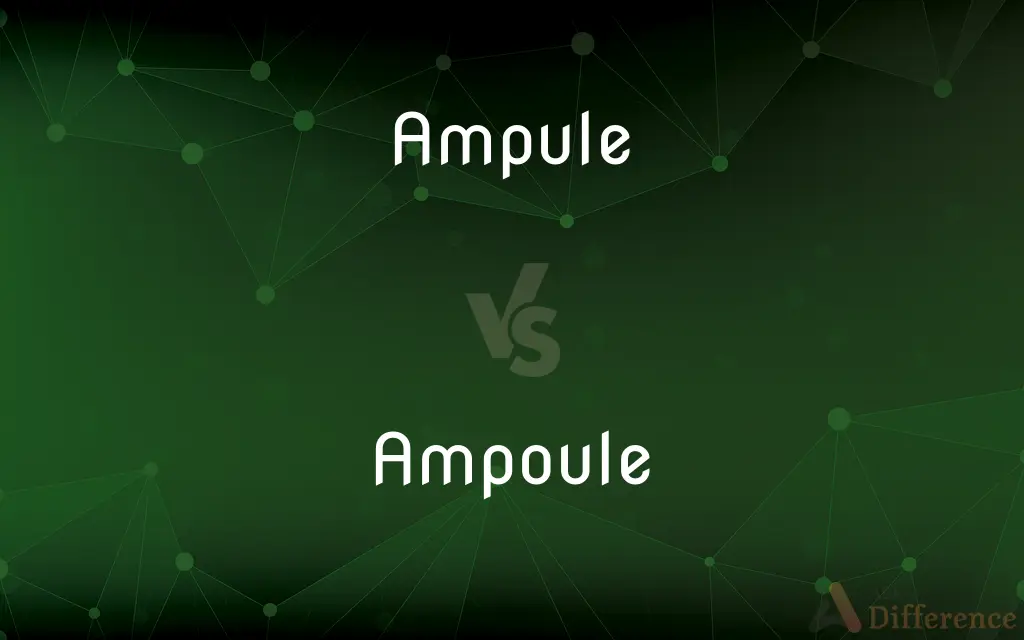Ampule vs. Ampoule — What's the Difference?
By Tayyaba Rehman & Urooj Arif — Updated on March 3, 2024
Ampule is an alternative spelling of ampoule; both refer to a sealed glass container for a liquid, especially for medicinal use.

Difference Between Ampule and Ampoule
Table of Contents
ADVERTISEMENT
Key Differences
Ampule, often used in American English, refers to a small sealed vial which is used to contain and preserve a sample, usually a solid or liquid. Whereas ampoule, preferred in British English, denotes the same type of container, emphasizing its role in pharmaceuticals and scientific applications.
Both terms describe containers that are specifically designed to hold pharmaceuticals and other chemicals in a sterile environment. However, the context in which they are used can vary, with ampule being more common in American contexts, while ampoule is often found in European or international settings.
The primary function of an ampule or ampoule is to protect its contents from air and contaminants, ensuring the integrity of the substance until its use. This is crucial for maintaining the efficacy of medications and the reliability of scientific samples.
Manufacturing processes for ampules and ampoules are similar, involving glass or plastic and a heat-sealing method to ensure sterility. The choice between the two terms often comes down to regional language preferences rather than differences in the manufacturing process.
The use of ampules and ampoules is governed by strict protocols to ensure safety and effectiveness. These protocols include proper storage, handling, and disposal practices, regardless of the terminology used.
ADVERTISEMENT
Comparison Chart
Spelling
Preferred in American English
Preferred in British English
Usage
Common in scientific American texts
Common in European/international texts
Pronunciation
/ˈæmpjuːl/
/ˈæmpuːl/ or /ˈæmpɒl/
Material
Glass or plastic
Glass or plastic
Application
Pharmaceuticals, chemicals
Pharmaceuticals, chemicals
Compare with Definitions
Ampule
A small sealed vial used to contain and preserve a sample, usually a liquid.
The nurse cracked open an ampule of medicine for the patient.
Ampoule
A sealed glass container for storing and preserving pharmaceuticals.
The doctor opened an ampoule of the drug for the procedure.
Ampule
A container for holding substances requiring protection from air and contaminants.
The scientist stored the chemical in an ampule for later testing.
Ampoule
Protects contents from air, ensuring the substance's integrity.
The ampoule's design prevents contamination until it's opened.
Ampule
Used primarily in American English.
The hospital ordered a new batch of ampules for the vaccine.
Ampoule
Utilized in clinical settings for their reliability and sterility.
For the test, a new ampoule of reagent was used.
Ampule
Made of glass or plastic and sealed to ensure sterility.
After filling, the ampule was sealed with a flame.
Ampoule
Preferred terminology in British and international English.
The clinical trial required ampoules of the vaccine.
Ampule
Essential in maintaining the efficacy of medications.
Each ampule contained a single dose of the antibiotic.
Ampoule
Similar manufacturing process as ampules, involving sterilization.
The ampoules were prepared under sterile conditions.
Ampule
A hermetically sealed vial made of glass or plastic that contains a sterile medicinal solution or a powder that is usually made into a solution for subcutaneous, intramuscular, or intravenous injection.
Ampoule
An ampoule (also ampul and ampule) is a small sealed vial which is used to contain and preserve a sample, usually a solid or liquid. Ampoules are usually made of glass.
Ampule
Alternative spelling of ampoule
Ampoule
A small sealed glass capsule containing a liquid, especially a measured quantity ready for injecting
An ampoule of adrenaline
Ampule
A small glass bottle which has been or can be sealed hermetically by application of flame to a narrow opening at the top.
Ampoule
A hermetically sealed vial made of glass or plastic that contains a sterile medicinal solution or a powder that is usually made into a solution for subcutaneous, intramuscular, or intravenous injection.
Ampule
An ampule, or vial resembling an ampule, which contains a drug.
Ampoule
A small hermetically sealed vial, often used to contain a sterile solution suitable for injection.
Ampule
A small bottle that contains a drug (especially a sealed sterile container for injection by needle)
Ampoule
Same as ampule.
Ampoule
A small bottle that contains a drug (especially a sealed sterile container for injection by needle)
Common Curiosities
Can ampules and ampoules be used interchangeably in medical settings?
Yes, the terms refer to the same type of container and can be used interchangeably, with the choice of term often depending on regional preferences.
Do ampules and ampoules have a specific disposal method?
Yes, due to their glass construction and potential hazardous contents, there are specific protocols for disposing of them safely.
How are ampules and ampoules sealed?
They are sealed through a heat process that ensures the container is airtight, maintaining sterility and integrity of the contents.
How do you open an ampule or ampoule safely?
Opening requires a specific technique to break the neck of the glass container safely, often involving a small file or snapping tool to prevent injury and contamination.
Are ampules and ampoules only used for pharmaceuticals?
While they are primarily used for pharmaceuticals, they can also contain other chemicals in scientific research and applications.
Is one more secure or sterile than the other?
Both offer the same level of security and sterility, as their design and manufacturing process are aimed at protecting their contents until use.
Is there a difference in the materials used for ampules and ampoules?
No, both are made from glass or plastic, depending on the specific application.
Is there a cost difference between ampules and ampoules?
The cost can vary depending on the manufacturer and quantity, but generally, there is no significant difference based on the term used.
Can the contents of ampules and ampoules be frozen?
Yes, but this depends on the substance inside and the material of the container, as some may not withstand freezing temperatures without cracking.
Are there size differences between ampules and ampoules?
No, both can come in various sizes, depending on the volume of the substance they are intended to hold.
How long can substances be stored in ampules and ampoules?
The shelf life depends on the substance and storage conditions, but the sealed environment helps extend the viability of many substances.
Can ampules and ampoules be reused?
No, they are designed for single use to ensure sterility and prevent contamination.
Are ampules and ampoules used in industries other than healthcare?
Yes, they can be used in any industry requiring sterile containment of liquids, including scientific research and chemical manufacturing.
How are ampules and ampoules packaged for safety?
They are often packaged in protective cardboard or plastic holders to prevent breakage during transportation and storage.
Are there any regulatory standards for ampules and ampoules?
Yes, there are regulatory standards that govern their manufacture, labeling, and use, especially in pharmaceutical applications.
Share Your Discovery

Previous Comparison
Protagonist vs. Antagonist
Next Comparison
Advance vs. PreponeAuthor Spotlight
Written by
Tayyaba RehmanTayyaba Rehman is a distinguished writer, currently serving as a primary contributor to askdifference.com. As a researcher in semantics and etymology, Tayyaba's passion for the complexity of languages and their distinctions has found a perfect home on the platform. Tayyaba delves into the intricacies of language, distinguishing between commonly confused words and phrases, thereby providing clarity for readers worldwide.
Co-written by
Urooj ArifUrooj is a skilled content writer at Ask Difference, known for her exceptional ability to simplify complex topics into engaging and informative content. With a passion for research and a flair for clear, concise writing, she consistently delivers articles that resonate with our diverse audience.















































